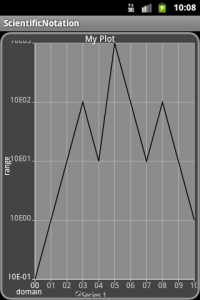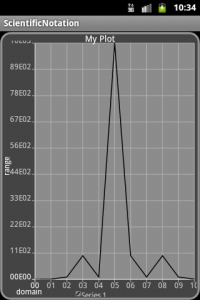Using Log Notation
[doc_header]
[last_updated_for version=0.5.1]
Overview
This is a quick look at how to plot using Log notation.
Log Values
package com.example;
import com.androidplot.xy.XYStepMode;
import android.app.Activity;
import android.graphics.Color;
import android.os.Bundle;
import com.androidplot.series.XYSeries;
import com.androidplot.xy.LineAndPointFormatter;
import com.androidplot.xy.XYPlot;
import java.text.DecimalFormat;
import java.text.FieldPosition;
import java.text.NumberFormat;
import java.text.ParsePosition;
public class MyActivity extends Activity {
@Override
public void onCreate(Bundle savedInstanceState) {
super.onCreate(savedInstanceState);
setContentView(R.layout.main);
// some y-values to be plotted. in this example these values are already log values:
XYSeries s1 = new XYSeries() {
private Number[] yVals = {0, 1, 2, 3, 2, 4, 3, 2, 3, 2, 1};
// x == i
@Override
public Number getX(int index) {
return index;
}
@Override
public Number getY(int index) {
return yVals[index];
}
@Override
public String getTitle() {
return "Series 1";
}
@Override
public int size() {
return yVals.length;
}
};
XYPlot plot = (XYPlot) findViewById(R.id.myPlot);
plot.addSeries(s1, new LineAndPointFormatter(Color.BLACK, null, null));
// set domain value labels to increment by 1 on each tick
plot.setDomainStep(XYStepMode.INCREMENT_BY_VAL, 1);
plot.setDomainValueFormat(new DecimalFormat("00"));
// set range value labels to increment by one on each tick
plot.setRangeStep(XYStepMode.INCREMENT_BY_VAL, 1);
plot.setRangeValueFormat(new NumberFormat() {
// use engineering notation
DecimalFormat df = new DecimalFormat("00E00");
@Override
public StringBuffer format(double v, StringBuffer stringBuffer, FieldPosition fieldPosition) {
// expand the log back out to it's original value before passing into df:
// note that this is a very inefficient way of doing things, but its easier
// to understand for the sake of this example.
return df.format(Math.pow(10, v), stringBuffer, fieldPosition);
}
// unused
@Override
public StringBuffer format(long l, StringBuffer stringBuffer, FieldPosition fieldPosition) { return null;}
// unused
@Override
public Number parse(String s, ParsePosition parsePosition) { return null;}
});
}
}
produces this:

Raw Values
In this example we plot raw y-vals using the same log labeling but because the yVals are raw, there is no log scaling applied.
package com.example;
import com.androidplot.xy.XYStepMode;
import android.app.Activity;
import android.graphics.Color;
import android.os.Bundle;
import com.androidplot.series.XYSeries;
import com.androidplot.xy.LineAndPointFormatter;
import com.androidplot.xy.XYPlot;
import java.text.DecimalFormat;
import java.text.FieldPosition;
import java.text.NumberFormat;
import java.text.ParsePosition;
public class MyActivity extends Activity {
@Override
public void onCreate(Bundle savedInstanceState) {
super.onCreate(savedInstanceState);
setContentView(R.layout.main);
// some y-values to be plotted. in this example these are raw values:
XYSeries s1 = new XYSeries() {
private Number[] yVals = {0, 10, 100, 1000, 100, 10000, 1000, 100, 1000, 100, 10};
// x == i
@Override
public Number getX(int index) {
return index;
}
@Override
public Number getY(int index) {
return yVals[index];
}
@Override
public String getTitle() {
return "Series 1";
}
@Override
public int size() {
return yVals.length;
}
};
XYPlot plot = (XYPlot) findViewById(R.id.myPlot);
plot.addSeries(s1, new LineAndPointFormatter(Color.BLACK, null, null));
// set domain value labels to increment by 1 on each tick
plot.setDomainStep(XYStepMode.INCREMENT_BY_VAL, 1);
plot.setDomainValueFormat(new DecimalFormat("00"));
plot.setRangeValueFormat(new DecimalFormat("00E00"));
}
}



